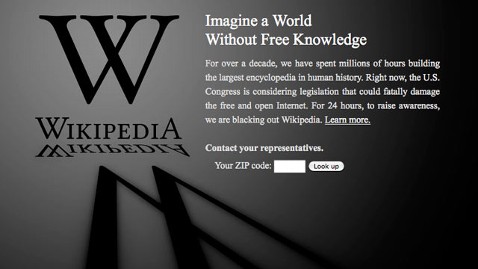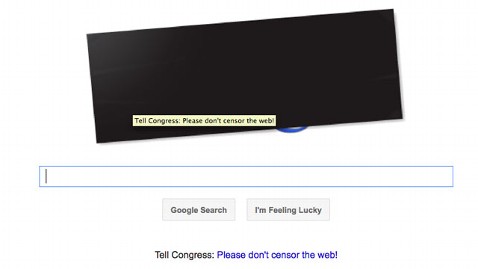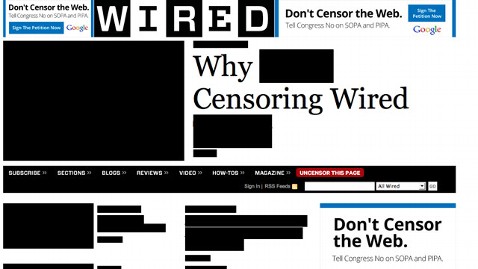Odds are, if you're reading this, you're online one way or another. Well, bad news - This website is being hosted on Blogger, which means if this bill is passed, we will have no more WNHT - Now, I understand, what's the big deal? Well, if you have a facebook, twitter, email account, sell stuff on ebay, have a youtube video page, or do almost ANYTHING online, you wont for much longer.
Please sign this petition below and pass this page on to your friends as well.
You can read more about this after the jump!
Please sign this petition below and pass this page on to your friends as well.
You can read more about this after the jump!
Go to Wikipedia’s English home page and it will look like its regular self for a second, but then –
 Go to Google‘s homepage, and you’ll find its logo blacked out. If you click on the black box in its place (or the link below the search box), you’ll be led to an invitation to petition Congress: “End Piracy, Not Liberty.”
Go to Google‘s homepage, and you’ll find its logo blacked out. If you click on the black box in its place (or the link below the search box), you’ll be led to an invitation to petition Congress: “End Piracy, Not Liberty.”
 The so-called SOPA blackout — protesting the Stop Online Piracy Act (SOPA for short) in the House of Representatives and the Protect IP Act in the Senate — has spread across the web today, perhaps the most widespread online lobbying effort ever coordinated by Internet entities.
The so-called SOPA blackout — protesting the Stop Online Piracy Act (SOPA for short) in the House of Representatives and the Protect IP Act in the Senate — has spread across the web today, perhaps the most widespread online lobbying effort ever coordinated by Internet entities.
Sites checked by ABC News did not actually “go dark” as originally threatened. Instead, they posted appeals to users to get in touch with their Congressional representatives to argue against passage of the two bills.
The bills were intended to protect movie makers, music publishers and other providers of online content who fear that in the digital age, people can copy what they’ve created and spread it without paying for it. They’ve said digital pirating is a major threat to their businesses. Supporters include the U.S. Chamber of Commerce and the Motion Picture Association of America. The Walt Disney Company, the parent company of ABC News, is among the firms supporting the legislation.
Internet companies have been complaining that the bills put them in the untenable position of having to be online police. They say they worry that the two bills could hold them responsible if users of their sites link to pirated content.
The companies said the bills could require your Internet provider to block websites that are involved in digital file sharing. And search engines such as Google, Yahoo and Bing could be stopped from linking to them — antithetical, they argue, to the ideal of an open Internet.
Wired.com ran a headline this morning that read, “Why We’re Censoring Wired Today” — if you could read it before most of the words on the page were symbolically redacted. (Move your cursor over the black bars and the words will reappear.)
The one headline that wasn’t blocked read: “Don’t Censor the Web. Tell Congress No on SOPA and PIPA.”

The protest put supporters of the bill on the defensive. Sen. Patrick Leahy, D-Vt., who chairs the Senate Judiciary Committee and first co-sponsored an anti-piracy bill in 2010, said he was open to amending PIPA to satisfy the objections.
Congressional staff, meanwhile, sent out messages defending the bills. “Websites ‘going dark’ today in protest of the PROTECT IP Act will not be affected by enactment of the legislation,” said one. “None of the following websites meet the definition of a site dedicated to infringing activities: Wikipedia; YouTube; Flickr; Twitter; Google; craigslist; eBay; The Huffington Post; Yahoo!.”
Could the bills still pass? Various combatants said they could have easily a few months ago. But the House bill is now on hold, and Florida Sen. Marco Rubio, a Republican who co-sponsored PIPA in the Senate, announced this morning on Facebook that he is withdrawing his support.
“We’ve heard legitimate concerns about the impact the bill could have on access to the Internet and about a potentially unreasonable expansion of the federal government’s power to impact the Internet,” said his post. “Congress should listen and avoid rushing through a bill that could have many unintended consequences.”
Senate Majority Leader Harry Reid (D-Nev.) had scheduled a procedural vote on the bill next week, but today Sen. John Cornyn (R-Texas) urged that it be delayed: “Stealing content is theft, plain and simple, but concerns about unintended damage to the internet and innovation in the tech sector require a more thoughtful balance, which will take more time.”
Rep. Darrell Issa, a California Republican who has sponsored an alternative bill, nicknamed OPEN, said it has more backers than the now-delayed SOPA: “First, Americans have a right benefit from what they’ve created. And second, Americans have a right to an open internet. Our duty is to protect these rights.”
Speaker of the House John Boehner, asked about the House bill today, said, “It’s pretty clear to many of us that there’s a lack of consensus at this point and I would expect that the committee would continue to work to try to build a consensus before this bill moves.”
Click Here for More: SOPA and PIPA Blackout Explained

Wikipedia's English-language landing page.

Google's homepage.
Sites checked by ABC News did not actually “go dark” as originally threatened. Instead, they posted appeals to users to get in touch with their Congressional representatives to argue against passage of the two bills.
The bills were intended to protect movie makers, music publishers and other providers of online content who fear that in the digital age, people can copy what they’ve created and spread it without paying for it. They’ve said digital pirating is a major threat to their businesses. Supporters include the U.S. Chamber of Commerce and the Motion Picture Association of America. The Walt Disney Company, the parent company of ABC News, is among the firms supporting the legislation.
Internet companies have been complaining that the bills put them in the untenable position of having to be online police. They say they worry that the two bills could hold them responsible if users of their sites link to pirated content.
The companies said the bills could require your Internet provider to block websites that are involved in digital file sharing. And search engines such as Google, Yahoo and Bing could be stopped from linking to them — antithetical, they argue, to the ideal of an open Internet.
Wired.com ran a headline this morning that read, “Why We’re Censoring Wired Today” — if you could read it before most of the words on the page were symbolically redacted. (Move your cursor over the black bars and the words will reappear.)
The one headline that wasn’t blocked read: “Don’t Censor the Web. Tell Congress No on SOPA and PIPA.”

The protest put supporters of the bill on the defensive. Sen. Patrick Leahy, D-Vt., who chairs the Senate Judiciary Committee and first co-sponsored an anti-piracy bill in 2010, said he was open to amending PIPA to satisfy the objections.
Congressional staff, meanwhile, sent out messages defending the bills. “Websites ‘going dark’ today in protest of the PROTECT IP Act will not be affected by enactment of the legislation,” said one. “None of the following websites meet the definition of a site dedicated to infringing activities: Wikipedia; YouTube; Flickr; Twitter; Google; craigslist; eBay; The Huffington Post; Yahoo!.”
Could the bills still pass? Various combatants said they could have easily a few months ago. But the House bill is now on hold, and Florida Sen. Marco Rubio, a Republican who co-sponsored PIPA in the Senate, announced this morning on Facebook that he is withdrawing his support.
“We’ve heard legitimate concerns about the impact the bill could have on access to the Internet and about a potentially unreasonable expansion of the federal government’s power to impact the Internet,” said his post. “Congress should listen and avoid rushing through a bill that could have many unintended consequences.”
Senate Majority Leader Harry Reid (D-Nev.) had scheduled a procedural vote on the bill next week, but today Sen. John Cornyn (R-Texas) urged that it be delayed: “Stealing content is theft, plain and simple, but concerns about unintended damage to the internet and innovation in the tech sector require a more thoughtful balance, which will take more time.”
Rep. Darrell Issa, a California Republican who has sponsored an alternative bill, nicknamed OPEN, said it has more backers than the now-delayed SOPA: “First, Americans have a right benefit from what they’ve created. And second, Americans have a right to an open internet. Our duty is to protect these rights.”
Speaker of the House John Boehner, asked about the House bill today, said, “It’s pretty clear to many of us that there’s a lack of consensus at this point and I would expect that the committee would continue to work to try to build a consensus before this bill moves.”
Click Here for More: SOPA and PIPA Blackout Explained


No comments:
Post a Comment